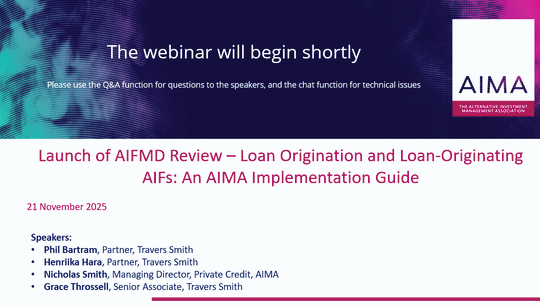Press Release: AIMA & ACC welcome publication of AIFMD which secures regulatory stability for the EU alternative investment industry
Published: 26 March 2024
The Alternative Investment Management Association (AIMA) and its private credit affiliate the Alternative Credit Council (ACC) welcome the publication today of the updated Alternative Investment Fund Managers Directive (AIFMD) in the Official Journal of the EU. Today’s publication marks an important milestone for AIMA and the ACC following our longstanding engagement with the EU institutions. As was the case with the high-level political agreement which was reached last summer, the final updated Directive secures regulatory stability for the EU alternative investment industry. In particular, we are pleased to see the cross-border lending passport now officially enshrined in EU law, something that AIMA & ACC have promoted throughout the legislative process.
The manner in which the EU institutions approved the review underlines the significance of AIFMD as a framework and by extension the alternative investment industry in providing financing throughout the EU. In the Council, all 27 Member States voted in favour of approving the review while in the European Parliament, a strong majority of Members of the European Parliament (MEPs) gave their endorsement. As part of our advocacy campaign, AIMA engaged directly with the Parliament and Council, i.e. Member States, both at the representative level in Brussels and with finance ministries in the respective capitals. We are pleased to see such a shared commitment to fostering cross-border investment and delivering the Capital Markets Union in the EU.
The final rules confirm that established practices in areas such as delegation and liquidity management continue to work well. In particular:
- Asset managers will continue to benefit from the ability to delegate portfolio or risk management to third parties, albeit with more requirements on substance and greater transparency to regulators regarding delegation arrangements.
- Firms will be subject to tighter restrictions around liquidity risk management.
- EU investors will continue to benefit from access to global expertise, as well as the broadest range of alternative investment strategies.
The agreement also includes new rules for loan origination funds (LOFs) aimed at addressing financial stability concerns.
- The cross-border passport is introduced so that managers and their funds can lend on a cross-border basis.
- LOFs will face higher levels of regulation when it comes to liquidity risk management, leverage and retention of loans to avoid ‘originate-to-distribute’ models.
- In addition to existing rules on leverage management, new differentiated leverage limits for open and closed-end funds are set in the legislation – at 175% and 300% of NAV respectively.
The Directive will now enter into force on 15 April 2024 and Member States have until 16 April 2026 to transpose the Directive into national law. This is not the end of the story, however. Firstly, we will be keeping a watchful eye on national transposition to ensure that Member States implement the Directive appropriately. AIMA is currently finalising a set of guiding principles for national transposition which we expect to deploy with the European Commission and national authorities in the coming weeks. Our guiding principles urge national authorities to faithfully implement the Directive into national law in a manner which respects both the spirit and letter of the Directive. Secondly, we will also turn our attention to the important level 2 work in the form of the technical standards to be developed by the European Securities and Markets Authority (ESMA) on areas ranging from reporting information to liquidity management. ESMA is due to hold stakeholder consultations to which we will respond in due course.
Jiri Krol, Deputy CEO and Global Head of Government Affairs, AIMA said: “We welcome most of the new rules on delegation, liquidity risk management and passporting for loan origination funds as relatively sensible. Some restrictions, such as leverage limits on loan funds, are difficult to justify but we have worked closely with policymakers to ensure they are better defined and calibrated than the original proposals. As usual, it’s a mixed bag and we hope the positive elements will outweigh the negatives. This updated framework will provide our members with greater certainty on the future regulatory framework and allow them to focus on delivering returns to investors and capital to the economy.”







